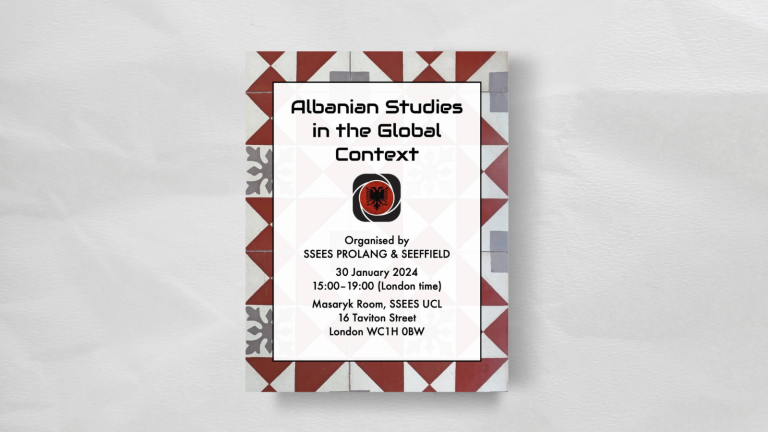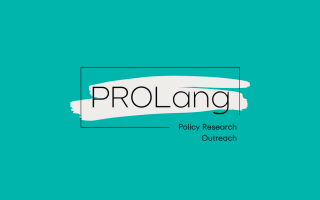Albanian Studies in the Global Context
30 January 2024, 3:00 pm–7:00 pm

You are cordially invited to the first PROLang event on Albanian language and studies, where we discuss the situation of Albanology around the world, with its successes and its challenges.
Event Information
Open to
- All
Availability
- Yes
Organiser
-
UCL SSEES
This event has been co-organised with the successful seeFField project from University of Regensburg.
The moderators of this event are Albanian language lecturers, Dr Mirela Xhaferraj (SSEES, UCL) and Lecturer Ledio Hala (Institute for Slavonic Studies, Seeffield Project, UR), together with Ramona Gonczol (SSEES, UCL), Associate Professor Romanian and convener of PROLang.
The first part of the event will bring together several academics discussing the teaching Albanian language as a foreign or heritage language, in several prestigious universities around the world.
The second part will feature academics teaching and researching on topics linked to Albanian studies in a wider sense, around the world.
This event is hybrid and will be recorded.
The event will be followed by a small reception and networking.
Opening remarks: Associate Professor Ramona Gonczol (UCL SSEES), Convener of the PROLang Group.
Part 1- TEACHING ALBANIAN AS A FOREIGN/SECOND LANGUAGE
1. Mirela Xhaferraj (UCL SSEES) Teaching Albanian as a foreign/second language in the UK,
2. Ledio Hala (Institute for Slavonic Studies, Seeffield Project, UR) Albanian Language Teaching and Studies in German Universities: Navigating Challenges, Celebrating Successes, and Sharing Best Practices.
3. Linda Mëniku (University of Tirana, Albania / Arizona State University, CLI) Textbooks for teaching Albanian.
4. Jin Qiao (Beijing Foreign Studies University), Policy Communication and Talent Cultivation in the Field of Higher Education between China and Albania,
5. Flora Koleci (University of Salento, Italy) The teaching of Albanian as a second language in the Italian context.
6. Lumnije Jusufi (Humboldt University of Berlin) Integration of vertical and horizontal varieties in the teaching of Albanian as a foreign language.
7. Aljula Jubani (Institute for European Studies, University of Tirana, Albania), Optimizing Albanian language learning by applying the CEFR framework.
8. Bardh Rugova (Universiteti i Prishtinës), Teaching Albanian as a Foreign and Heritage Language: Exploring Educational Approaches at the International Seminar on Albanian Language, Literature, and Culture.
9. Maria Morozova (Russian Academy of Sciences) Alexander Rusakov (Academy of Sciences of Albania), Teaching and learning Albanian studies in Saint Petersburg.
Part 2- ALBANIAN STUDIES ABROAD
1.Eda Derhemi (University of Illinois Urbana-Champaign), The faint presence of Albanian studies in the US.
2. Enkeleida Kapia (Academy of Albanian Studies Tirana/ LMU Munich), Albanian studies in Munich: a multifaceted story of language variation and change in modern Albanian.
3. Ardian Marashi (INALCO, France), Albanian in INALCO: history, organization, challenges.
4. Orkida Backus Borshi (Charles University Prague), Albanian Studies at Charles University in Prague: New Perspectives
5. Emine Sadiku (Federal Language Agency Cologne), Teuta Toska (University of Elbasan), Positioning Albanian as a Second Language: Mapping the Evolution of an Emerging Academic Domain within the Linguistic Framework of Albania.
6. Blerta Ismajli (University of Prishtina), Preserving heritage language through music: Albanian-German bilingual rap music.
7. Michiel de Vaan (University of Basel), Albanian studies in Switzerland.
Event flyer by Dr David Hosaflook, Institute of Albanian and Protestant Studies


 Close
Close

